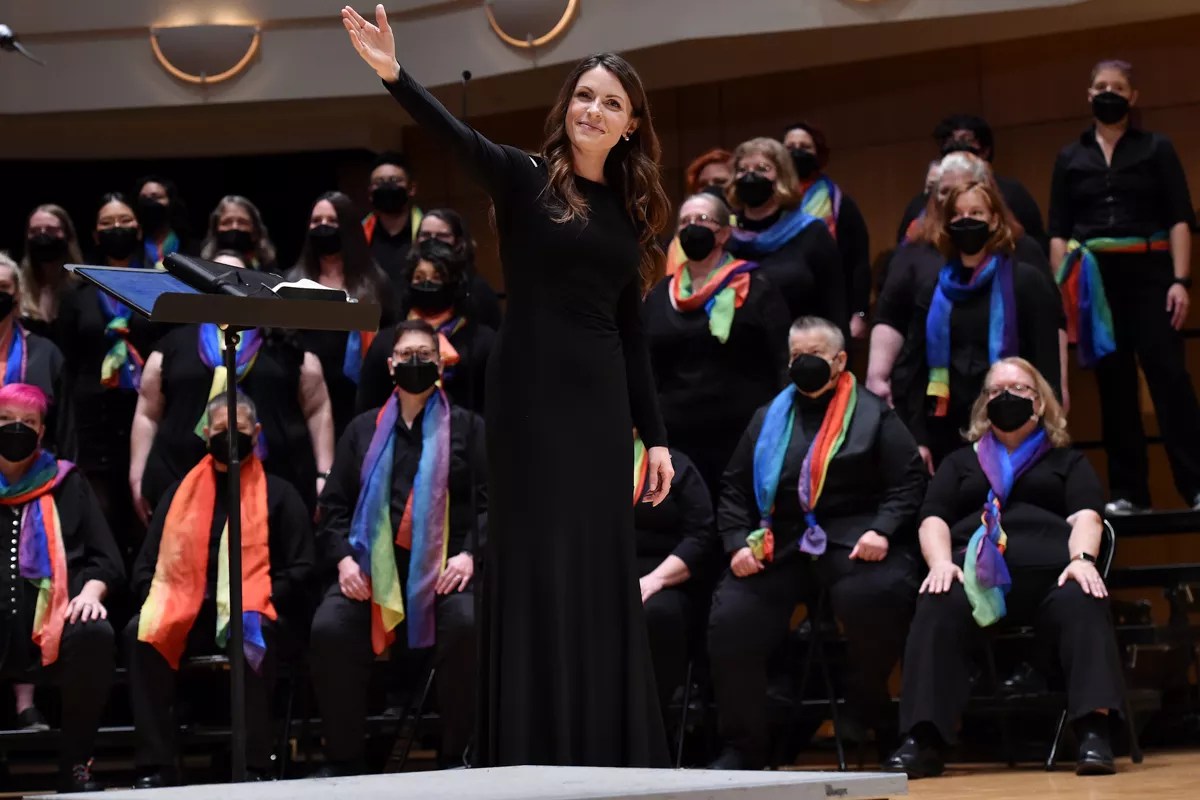
Seth McConnell

Audio By Carbonatix
“We’ve planned concerts that really center around bodily autonomy and reproductive rights for all people,” says Clelyn Chapin, artistic director for the Denver Women’s Chorus. “A lot of our music is pretty intense and protest-driven, but expresses a lot of hope for change, as well.”
When the U.S. Supreme Court overturned Roe v. Wade in June, members of the longtime local choral group decided to arrange a series of concerts to make their voices heard. After months of planning, they’ll offer three performances of “My Body, My Voice” in Denver this weekend.
The shows will include work by Brandi Carlile, Alicia Keys, Beyoncé and composers Andrea Ramsey and Melissa Dunphy. “All those artists are pretty connected to women’s-rights issues,” Chapin says. “The songs we’ve chosen talk a lot about using your voice for change and about women taking power.”
The chorus has also rewritten the 1966 Lesley Gore hit “You Don’t Own Me” to make it more relevant to today, and will perform “Canción Sin Miedo” (Song Without Fear), by Mexican singer Vivir Quintana. “It is a really big protest song in Mexico,” Chapin says. “It is protesting violence against women in Mexico, which is really about how a lot of us feel about new laws that are popping up and taking women’s rights away and preventing access to health care.”
The chorus previewed some of the songs in the show at the Denver Womxn’s March in early October, and Chapin wants to continue bringing choral music to marches and other community activism-related events.
The chorus has partnered with the Colorado Organization for Latina Opportunity and Reproductive Rights, a Latina-led group that works to advance reproductive justice for Coloradans, particularly those in the Latinx community. And that’s important, Chapin notes, because the anti-abortion laws disproportionately impact people of color. “They are a really cool organization that maybe doesn’t get as much airtime as a national organization like Planned Parenthood,” Chapin says. “We love the work Planned Parenthood is doing, but we also wanted to support the work of a smaller organization.”
Chapin admits that when she heard that the Supreme Court had overturned Roe v. Wade, she didn’t feel immediate fear; living in Colorado, she considers herself to be in a place of relative privilege. But while this state’s government appears committed to protecting women’s rights, she has relatives who live in Arkansas and Texas – states where access to abortion is actively being taken away.
“I have family members who’ve had abortions for medical reasons,” she says. “They may have not survived or may have experienced major health crises with their pregnancies with the new legislation that’s in place in those states.”
The 140-member Denver Women’s Chorus got its start in 1984, when it was founded by Carol White and a group of lesbian women. In its early years, some singers kept their membership secret for fear of being outed as gay, Chapin says. Today the chorus is transgender- and nonbinary-inclusive, composed of LGBTQ+ singers and allies.
The group has always had a strong sense of social justice, and the general vibe at the chorus following the Supreme Court decision was one of “big feelings” – chief among them being “pissed off,” Chapin says.
“I think you would hear that at just about every rehearsal,” she adds. “We vacillate between despair and discouragement with the Supreme Court. But we are also a group of very politically active individuals. Singing at the Womxn’s March was a really cathartic event.”
The group’s emotions come across in its music. The chorus will sing in the traditional way – with tall, round and perfect vowels. But then it can change its tune.
“There are a lot of sounds that we create as an ensemble that are gritty, that are rough, that are maybe a little aggressive,” Chapin says. “That’s just as important a part of artistry as anything pretty or beautiful, as would be the goal for more traditional choirs.”
This group has other goals, including advocating for the rights of people through collective singing, which played a big role in the civil rights movement. “Collective singing was a backbone of organizations,” Chapin notes. “It kept people together and gave them a common vocabulary and message. That’s a reason I’m really focused on the message and really conveying our emotions in this concert rather than the perfect choral sound.”
The upcoming concerts will also have what Chapin calls a “call to action” component. The League of Women Voters will be on hand to register audience members to vote, for example. And Chapin wants people to leave energized, maybe even a little angry, but not so angry that they lose hope moving forward.
“As much as we have songs that express anger,” she says, “we also have songs that express power.”
My Body, My Voice, 7:30 p.m. Friday, November 4, and 2 and 7:30 p.m. Saturday, November 5, Central Presbyterian Church Denver, 1660 Sherman Street; 3 p.m. Sunday, November 6, Broomfield Auditorium, 3 Community Park Road, Broomfield. Tickets start at $25, and livestream access is also available; for more information, visit denverchoruses.org.